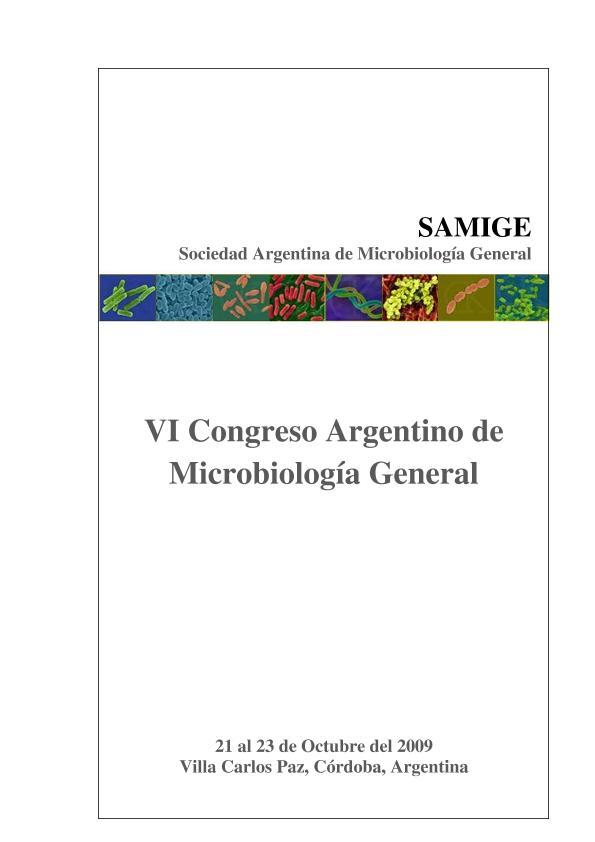Mostrar el registro sencillo del ítem
dc.contributor.author
Pescaretti, María de Las Mercedes

dc.contributor.author
Lopez, Fabian Enrique

dc.contributor.author
Morero, Roberto Dionisio

dc.contributor.author
Delgado, Monica Alejandra

dc.date.available
2023-04-21T17:03:06Z
dc.date.issued
2009
dc.identifier.citation
Conditioned mediums modulate expression of the RcsB-regulon genes in S. typhimurium; VI Congreso Argentina de Microbiología General; Villa Carlos Paz; Argentina; 2009; 83-83
dc.identifier.uri
http://hdl.handle.net/11336/194975
dc.description.abstract
The Rcs is an unusual phosphorelay system composed of the inner membrane proteins RcsC and RcsD as sensors, and the response regulator RcsB. At the present, the signals that lead to activate the Rcs phosphorelay system remain unknown. Even though, a wide range of conditions have been described as Rcs system activation state. The growth at low temperature or on solid surface; the polymyxin B exposition; the DjlA overproduction, the rcsC11 constitutive mutation; mutations that affect cell envelope like tolB and pmrA, or rcsB overexpression are some examples of this activation states. Previously, we reported that the rcsB gene is transcribed from two promoters: i) PrcsDB located upstream of rcsD, and ii) PrcsB located within the rcsD coding region. The first promoter is induced during the exponential growth phase while the last one it does at lower levels in stationary phase. We also reported that the RcsB overproduction repressed the rcsD expression by directly binding to the PrcsDB promoter. The repression, resulting in a differential rate of rcsD and rcsB genes expression levels, was also observed using rcsC11 mutant or polymyxin B to induce the system. Under these conditions an increased level of RcsB was observed when the bacteria reach the stationary growth phase and the regulator began to be also transcribed from PrcsB. In addition, the PrcsB is physiologically required to maintain the repression on swarming behavior. The subject of the present work was to determine if an Rcs stimulation factor is excreted to the supernatant of tolB and pmrA mutant culture. This finding would allow us to identify the Rcs system signal. Here, the supernatant obtained from the above mutants cultures, as ?conditioned mediums?, was used to determine the reporter expression levels. The cps and flhDC operons were the reporter of the factor presence in the conditioned mediums. We demonstrated that the cps and flhDC operons were modulated under the growth on these mediums. As RcsB regulator is expressed exponential and stationary phase and the above reporters are exponentially controlled, we looking for reporter RcsB-depended gene that are transcribed in stationary phase like bapA gene. Here we report that asr is a new member of the RcsB regulon, which was reported as an stationary phase expressed gene. Additionally, we studied the expression modulation of asr, bap, cps and flhDC using conditioned medium harvested from both different growth phase in order to relate with expression of RcsB regulator. Under this condition we observed a growth phase-dependent expression mediated by RcsB. These results increase the Rcs system knowledge on regulon and ligand identification issues.
dc.format
application/pdf
dc.language.iso
eng
dc.publisher
Sociedad Argentina de Microbiología General
dc.rights
info:eu-repo/semantics/openAccess
dc.rights.uri
https://creativecommons.org/licenses/by-nc-sa/2.5/ar/
dc.subject
Salmonella
dc.subject
RcsCDB system
dc.subject
Patogénesis
dc.subject.classification
Bioquímica y Biología Molecular

dc.subject.classification
Ciencias Biológicas

dc.subject.classification
CIENCIAS NATURALES Y EXACTAS

dc.title
Conditioned mediums modulate expression of the RcsB-regulon genes in S. typhimurium
dc.type
info:eu-repo/semantics/publishedVersion
dc.type
info:eu-repo/semantics/conferenceObject
dc.type
info:ar-repo/semantics/documento de conferencia
dc.date.updated
2023-04-17T11:13:55Z
dc.journal.pagination
83-83
dc.journal.pais
Argentina

dc.description.fil
Fil: Pescaretti, María de Las Mercedes. Consejo Nacional de Investigaciones Científicas y Técnicas. Centro Científico Tecnológico Conicet - Tucumán. Instituto Superior de Investigaciones Biológicas. Universidad Nacional de Tucumán. Instituto Superior de Investigaciones Biológicas; Argentina
dc.description.fil
Fil: Lopez, Fabian Enrique. Consejo Nacional de Investigaciones Científicas y Técnicas. Centro Científico Tecnológico Conicet - Tucumán. Instituto Superior de Investigaciones Biológicas. Universidad Nacional de Tucumán. Instituto Superior de Investigaciones Biológicas; Argentina
dc.description.fil
Fil: Morero, Roberto Dionisio. Consejo Nacional de Investigaciones Científicas y Técnicas. Centro Científico Tecnológico Conicet - Tucumán. Instituto Superior de Investigaciones Biológicas. Universidad Nacional de Tucumán. Instituto Superior de Investigaciones Biológicas; Argentina
dc.description.fil
Fil: Delgado, Monica Alejandra. Consejo Nacional de Investigaciones Científicas y Técnicas. Centro Científico Tecnológico Conicet - Tucumán. Instituto Superior de Investigaciones Biológicas. Universidad Nacional de Tucumán. Instituto Superior de Investigaciones Biológicas; Argentina
dc.relation.alternativeid
info:eu-repo/semantics/altIdentifier/url/https://samige.org.ar/wp-content/uploads/2022/10/Libro-SAMIGE-2009.pdf
dc.conicet.rol
Autor

dc.conicet.rol
Autor

dc.conicet.rol
Autor

dc.conicet.rol
Autor

dc.coverage
Nacional
dc.type.subtype
Congreso
dc.description.nombreEvento
VI Congreso Argentina de Microbiología General
dc.date.evento
2009-10-21
dc.description.ciudadEvento
Villa Carlos Paz
dc.description.paisEvento
Argentina

dc.type.publicacion
Book
dc.description.institucionOrganizadora
Sociedad Argentina de Microbiología General
dc.source.libro
Libro de resúmenes del VI Congreso Argentino de Microbiología General
dc.date.eventoHasta
2009-10-23
dc.type
Congreso
Archivos asociados
